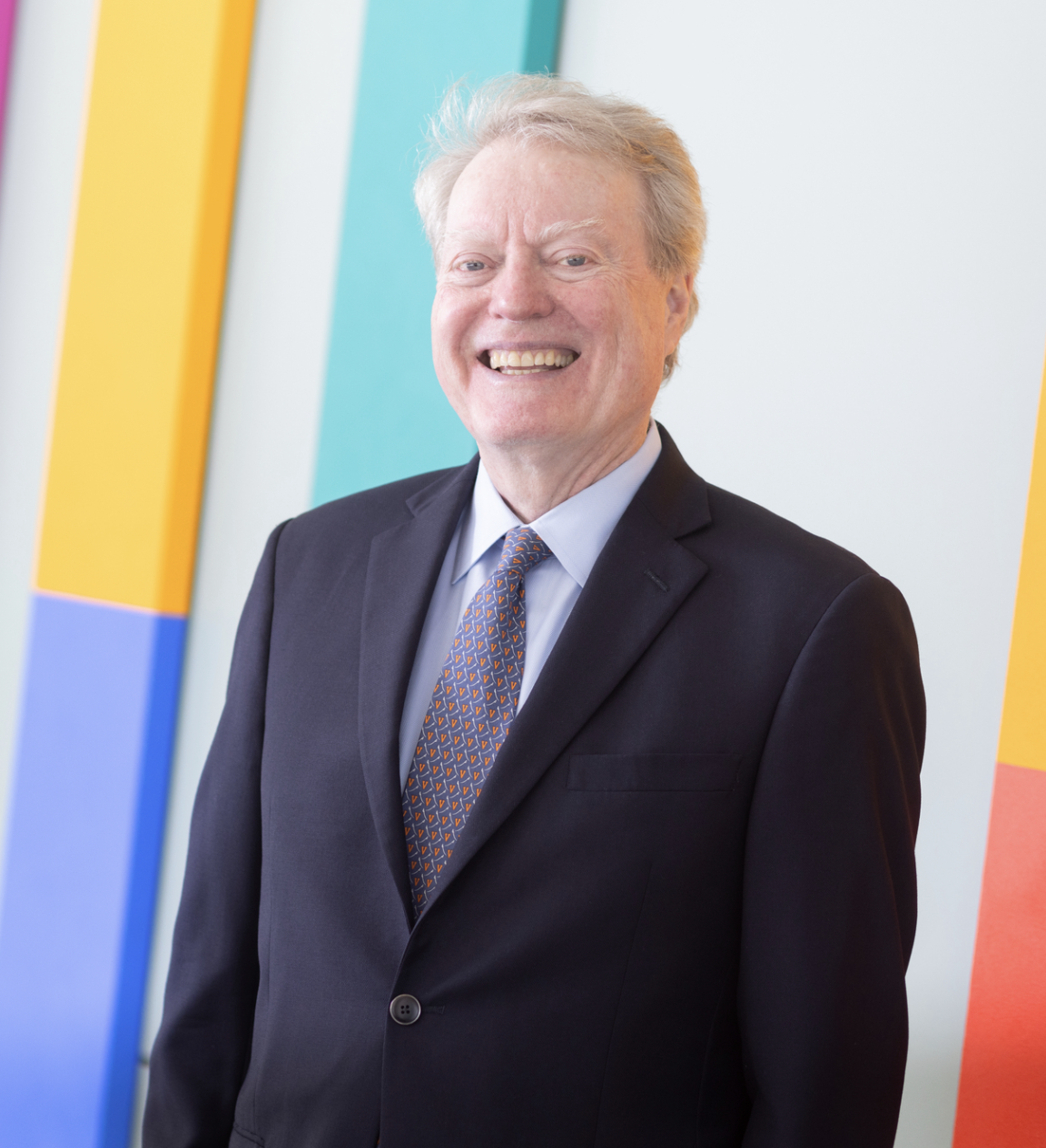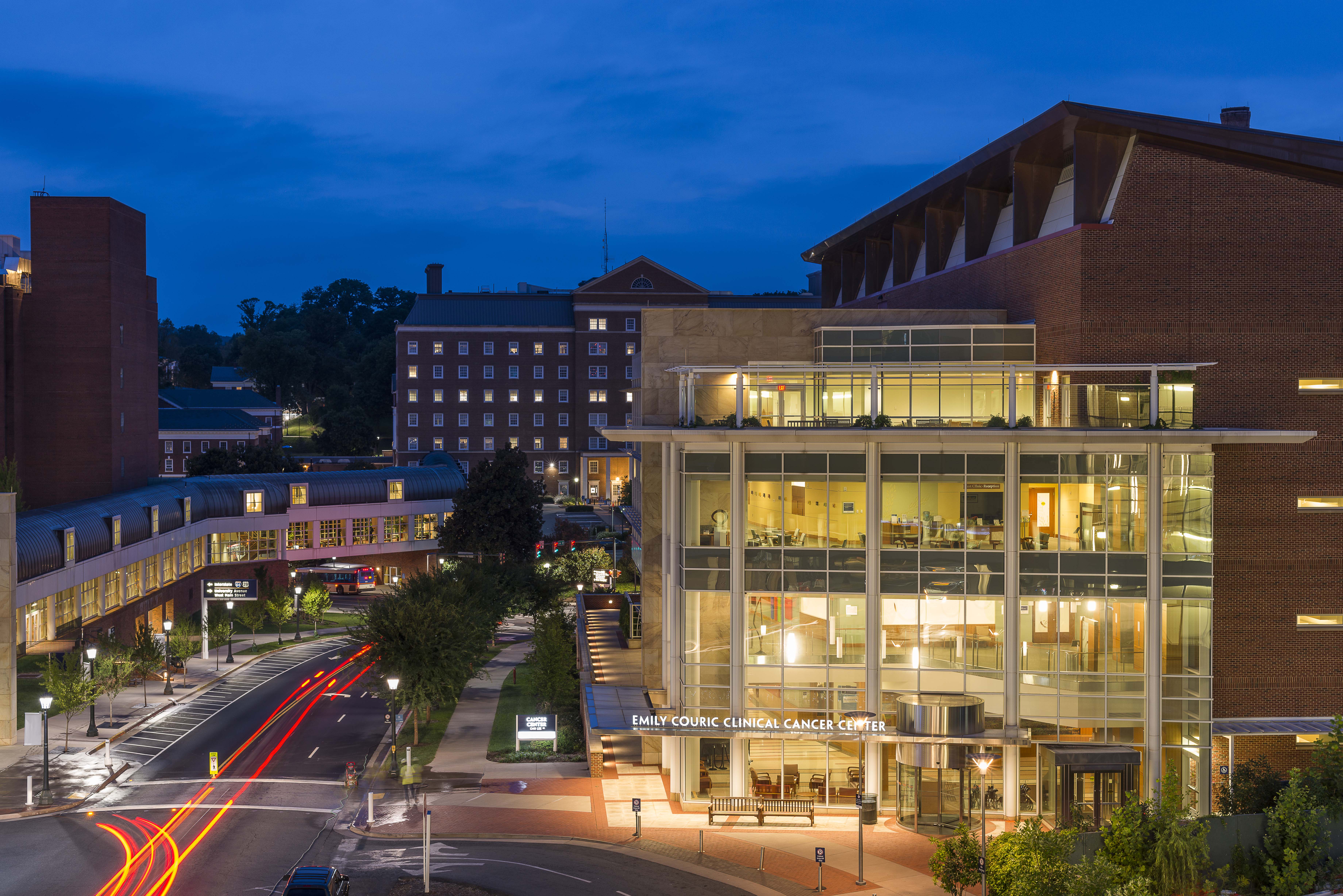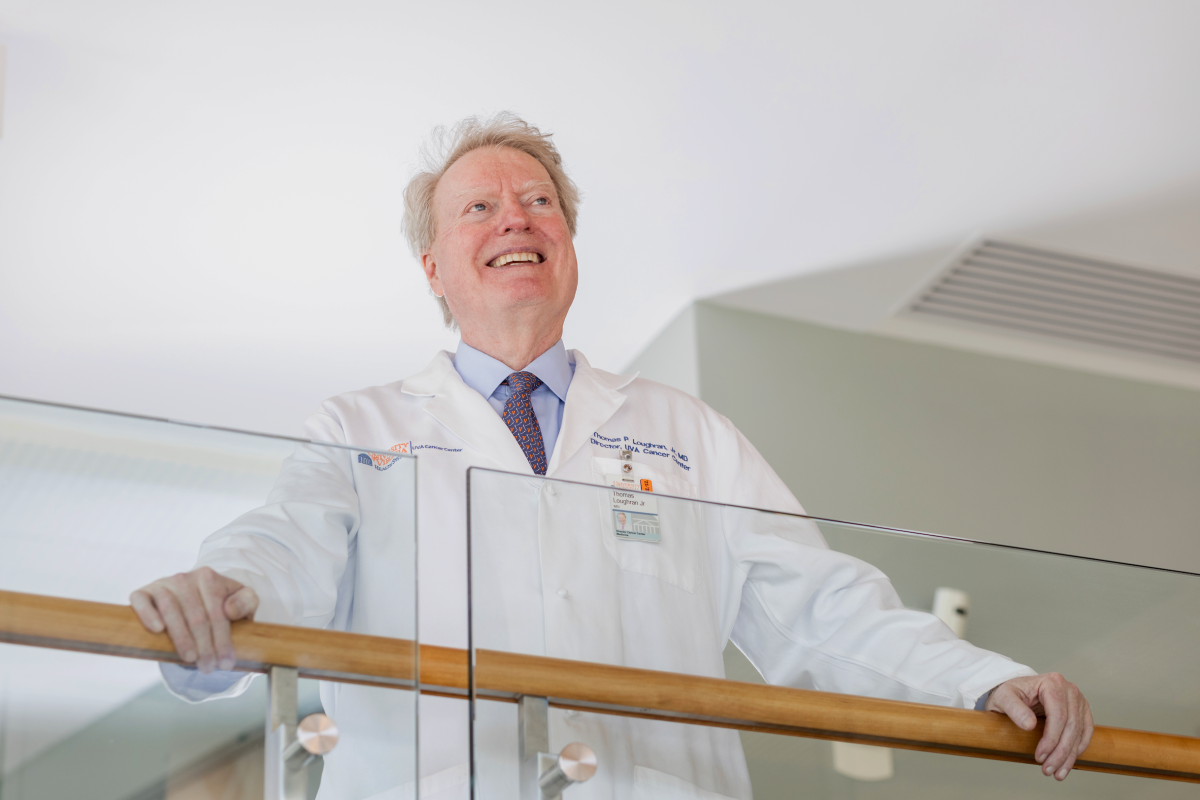Achievements and Ambitions
During ten years as director of UVA Cancer Center, Thomas P. Loughran Jr., MD, has overseen groundbreaking advancements in cancer care, research, and education and the Center’s increased efforts to reduce cancer disparities in the communities it serves. In 2022, his visionary leadership culminated in UVA becoming the first cancer center in Virginia to be designated a Comprehensive Cancer Center by the National Cancer Institute. This new designation elevated UVA Health’s national standing in cancer care—increasing patient demand and attracting top-tier faculty, clinicians, and staff. This achievement also directly underscores UVA Health’s mission of “transforming health and inspiring hope for all Virginians and beyond” and highlights the institution’s unwavering commitment to improving the lives of those affected by this devastating disease.
Dr. Loughran recently signed on to lead the Cancer Center for another five years. In this Q&A with Investing in Hope, he looks back on key accomplishments from the past decade and shares his vision for taking the Cancer Center to even greater heights. For example, he illuminates ways the new Paul & Diane Manning Institute of Biotechnology will facilitate the development of revolutionary new medicines, nanotechnologies, and cellular therapies to treat cancer. He also describes interdisciplinary collaborations among the Cancer Center’s diverse faculty and researchers that will continue to fuel transformational discoveries that extend and save lives.
Q. Congratulations on your appointment for another five years as director of UVA Cancer Center. In 2022, under your leadership, UVA received a Comprehensive Cancer Center designation from the National Cancer Institute—an extraordinary achievement. How has that impacted care, research, education, community outreach, and equity for the communities we serve?
A. Attaining Comprehensive status has been like a magnet for attracting patients as well as faculty, clinicians, and researchers. Our patient volume increase has been brisk all along, at approximately 10-15% every year since I started in this role before we received Comprehensive status, and we are now seeing an acceleration of these numbers. There’s also widespread recognition that the institution has raised the level of our research, so it helps us attract world-class faculty, clinicians, and staff.
A significant lynchpin to our success in becoming a Comprehensive Cancer Center was establishing a population research program that directly benefits the region we serve. Fortunately, we received Comprehensive status on our first application while building this program and increasing our community outreach and engagement.

Q. Would you please explain some of the efforts on precision population health by the Cancer Center?
A. The cancer center is dedicated to participating in and supporting President Ryan’s grand challenge on precision population health. Our part of this vital effort is explicitly focused on cancer research in our rural catchment area. By studying our region's cancer issues and demographics, we hope to reduce existing disparities and strengthen equity to help people live healthier, longer lives.
Q. How will the new Manning Institute of Biotechnology intersect with the work of the Cancer Center?
The new Manning Institute will undoubtedly raise our profile in the biotechnology field and strengthen our research capacity, some of which will be focused on cancer. We are exploring many areas with leadership to leverage various aspects of the Institute. It will likely give us access to new technologies and enhance our capabilities for leading-edge research. Additionally, it will bring to Charlottesville many world-class researchers pursuing transformational, life-changing discoveries in all areas of medicine.
The major areas in the Manning Institute related to cancer research include nanotechnology, drug discovery, and cellular therapy. We already have established components of those areas here at the Cancer Center, which have had a positive translational clinical impact. I’m certain many incoming, world-class faculty will become Cancer Center members because of their research focus. Lastly, I’m excited to be on the search committee to identify a transformational leader who will help us build the Manning Institute into one of the premier biotechnology centers in the nation.
Q. The Cancer Center extends beyond UVA Health to many parts of the University. Please give us a background on this and provide an example of a current project that reflects cross-Grounds collaboration.
A. The Cancer Center currently spans six schools and multiple areas of study across the University. This includes the schools of Medicine, Nursing, Education, Data Science, Engineering, and Arts & Sciences. We currently have 200+ members and typically have five to six new membership applications each month.
A recent example of a cross-Grounds collaboration is when we received a $12 million grant from the National Institute of Health’s National Cancer Institute (NCI) to establish a center of excellence in systems biology. Matt Lazzara and Kevin Janes, both in biomedical engineering, are the principal investigators with a cancer focus, along with others from the School of Medicine. It started with the Cancer Center contributing significant pilot funding to achieve initial results. The process was coordinated through the Cancer Center and Jill Slack-Davis, PhD.
This new center just had its first-year external advisory board meeting, in which I participated. The teams from the NCI and other outside experts were impressed with the progress that has taken place in just one year.
Q. There are currently 54 NCI-designated Comprehensive Cancer Centers across the United States. What distinguishes UVA from the others?
A. I’m on an NCI subcommittee that evaluates cancer centers, and each center is assessed by its own strengths. What differentiates us is our catchment area, which includes a large rural area of approximately one million people—one of the largest rural populations served in America.
Some of our initiatives across Grounds are also unique, like collaborations with engineering, biomedical engineering, and the nanoStar [nanotechnology] Institute. We’ve been an NCI-designated Cancer Center since 1986, primarily on the strength of basic science. Numerous landmark discoveries in cancer arose from UVA science, like the elucidation of the MAP kinase pathway arising from work by the late Mike Weber, PhD, former director of UVA’s Cancer Center, and his senior colleagues at the Cancer Center. Also, one of the first tumor-specific antigens was identified here by professor of chemistry and pathology Donald Hunt, PhD, in collaboration with Dr. Craig Slingluff. This led to Dr. Slingluff’s internationally known peptide vaccination program for patients with melanoma.

Q. UVA has the only Focused Ultrasound Cancer Immunotherapy Center in the world. Scientists at this new Center have successfully used focused ultrasound technology to augment immunotherapies to treat certain cancers. Please tell us about that effort and its potential.
A. The landmark discoveries made here in focused ultrasound involved treating patients with Parkinson’s disease and essential tremor. In recent years, we also discovered that combining immunotherapy with focused ultrasound, a precision, non-invasive method to target ultrasound energy for certain types of tumors, has overcome existing limitations of immunotherapy alone. Due to this success, we launched the world’s first Focused Ultrasound Cancer Immunotherapy Center.
With this technology, as the targeted cancer cells die, they release their surface cellular proteins, and the immune system is supercharged when it recognizes those cells. This approach has shown promising results and has opened new fronts in the war against various forms of cancer, from breast cancer to brain tumors. We are excited about the potential of this technology and are continuing to advance and test it on a wide variety of cancers.
Q. What are other unique areas of research at the Cancer Center?
A. UVA Cancer Center is funding a program to examine cancer disparities by establishing a cohort study in Danville, Virginia, led by Dr. Li Li and Jamie Zoellner, PhD. The focus is on understanding the mechanisms behind the higher risk of colorectal cancer in Black populations. The background for this initiative began with the scientific findings of Graham Casey, PhD. He discovered genomic and epigenetic differences in right- versus left-side colon cancer in Black versus white patients. We also learned that colorectal cancer occurs earlier in Black people than in white people. This project aims to understand better the biological differences that might explain why Black individuals are more at risk of getting right-sided colon cancer. Understanding this process will enable us to intervene earlier for potentially better outcomes.
Q. UVA Health has expanded its reach to clinics in northern Virginia and other communities across the commonwealth. What does this mean for patients in those communities, and how does it relate to what is happening clinically in Charlottesville?
A. In particular, coming to UVA in Charlottesville is crucial if you received a recent cancer diagnosis and need a second opinion. For example, there are over 80 types of lymphoma in my field of research. That requires a team, particularly pathologists, who are experts, to determine the correct diagnosis. Secondly, the first treatment plan gives you the best chance of being cured. So, make sure you have the best treatment plan in place from the beginning. If that treatment is a standard therapy that can be administered in a patient’s community, we will gladly send them back. Still, we often offer many innovative treatments not offered in community hospitals.
The second issue is if you have a recurrence of your illness. In this case, patients should come and see us right away, as we may have some newer therapies in the form of clinical trials. These trials may even be available, if appropriate, for patients for their first treatment.
Our Augusta site has also had an incredible increase in volume over the last year and expanded under UVA Community Health. We also hired cancer specialists in other locations in northern Virginia, which we see as a tremendous opportunity due to the large population in that area. Furthermore, physician specialists from Charlottesville also see patients at this and other sites across the commonwealth.
Q. What areas at the Cancer Center benefit from private philanthropic support?
A. We are sincerely grateful to have visionary donors who provide support to all areas of the Cancer Center. These generous supporters give to many targeted areas of cancer research that lead to life-extending discoveries and help us improve patient care. Many donors provide funding that enables novel, early-stage research that may generate positive results, leading to larger federal grants.
Support for unrestricted funds is one of the most effective ways to convert the priorities of the Center into reality. Much of this money is used toward recruiting dynamic faculty and researchers, especially for startup packages, including funding for their research and building their team here. Our leading candidates often seek endowments that provide security for their salary and for continuing operations, clinical or lab-based. These honorary endowments come with prestige; many researchers won’t even consider coming here without one.
Q. Lastly, what is your vision for the Cancer Center in the next five years?
A. I’m excited about collaborating with School of Medicine Dean Melina Kibbe, who’s brought in world-class faculty and researchers and gifted department chairs.
Becoming and growing a Comprehensive Cancer Center takes an enormous amount of planning and execution. We just recruited Dr. Marquita Taylor, our inaugural director of DEI, who will be essential to UVA and our efforts to serve our patients better. Additional goals include developing more clinical trials that come directly from discoveries made by UVA members. We are particularly inspired by our community advisory board, which is part of our Community Outreach and Engagement program, to give us input on the needs of their communities. Excitingly, we have established a translational research team that is organized to address problems occurring within our catchment area, like breast, lung, and colorectal cancer.
We are also working with the dean of the College of Arts & Sciences to recruit cancer-focused medicinal chemists to the Chemistry Department. That coincides with the efforts of our new senior associate dean for research, Jeffrey Martens, PhD, who is working to build a drug discovery program—another great cross-Grounds collaboration.
Furthermore, we are strengthening our translational research pipeline. This includes working with teams from UVA’s Licensing & Ventures Group and the School of Medicine to develop promising drug candidates that could advance into the clinic. The Cancer Center will provide funding to get this process started, and there will be internal and external reviews from people in the biotech and pharmaceutical industries to provide guidelines for development. Our future looks very bright!
To learn more about UVA Comprehensive Cancer Center’s groundbreaking research programs, please contact Corley Raileanu, Executive Director of Development, Cancer Programs, at corley@virginia.edu or 434-243-3480 or call 800.297.0102.

